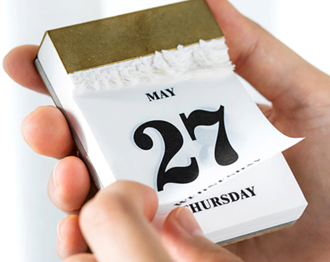When does a day begin?
14-07-2025 - Posted by Geert-JanOriginally posted on March 09, 2021 - by Andre Piet
Recently, I gave a Bible study on the prophecy in Hosea 6, where it is foretold that Israel would rise “after two days” and “on the third day,” specifically “at dawn,” i.e., at the beginning of the third day. But how does that actually work regarding the start of the day? Is it, as I argued, at sunrise? If so, how does that align with the day division on the Hebrew calendar? Isn’t it true that Jews count days from evening to evening?
The Definition of the Word ‘Day’
We don’t need to speculate about what a day is because Scripture already confirms this in the first chapter of the Bible with a Divine word. Genesis 1:5:
And God called the light ‘day,’ and the darkness He called ‘night.’
Just as light stands opposite darkness, so day stands opposite night. That means that when the sun rises and it becomes light, the day begins. It also automatically means that when the sun sets (= evening), the day ends. A day in the Bible, therefore, does not last twenty-four hours but (on average) twelve hours. Or as Jesus rhetorically asked: “Are there not twelve hours in the day?” (John 11:9).
A full day (or Dutch ‘etmaal’) is distinct from this and refers to a day plus a night. Etymologically, it literally means ‘return’ (‘et’ = back and ‘maal’ is time). A full day is the period in which a day returns, i.e., completes a full cycle: from day to day, totaling twenty-four hours.
A Calendar Day
Just as the day begins when it becomes light, it also ends when it becomes dark. That explains the old phenomenon that at nightfall, the date changes. The day is then over. In various festivities, we see from ancient times that preceding evenings are counted with the following day. Think of Christmas Eve on December 24, New Year’s Eve on December 31, or Sinterklaasavond on December 5.
But more importantly, we also encounter this phenomenon of the end of the day in the Bible and the Hebrew calendar. When the day is over, it’s as if the calendar page can be torn off. In the instructions about Yom Kippur, we read in Leviticus 23:
It shall be a Sabbath of rest for you, and you shall humble your souls on the ninth of the month in the evening. From evening to evening, you shall celebrate your Sabbath.
Yom Kippur is celebrated as a Sabbath from evening to evening. From the moment one day is over until the moment the next day is over.
Conclusion
When Hosea 6 speaks of “after two days,” the nights are entirely disregarded and not counted. The third day begins at dawn, i.e., at sunrise.

 English Blog
English Blog